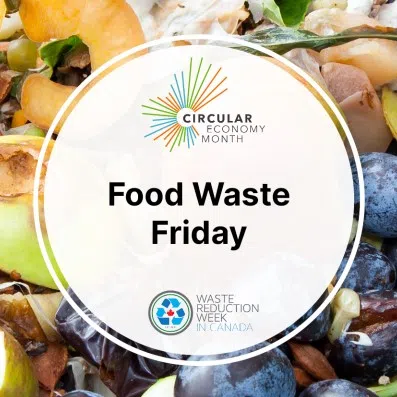Waste Reduction Week (October 21-28) recognizes Friday as Food Waste Friday.
The Circular Innovation Council of Ontario reports that, according to the updated report by Second Harvest and Value Chain Management International (October 2024), across Canada, nearly 46.5% of all food produced is wasted.
That equates to 21.18 million metric tonnes of food waste, nearly 41.7% of which is still edible.
It’s enough to feed more than 17 million people every year and amounts toa loss of $58 billion in value.
Food waste in Canada is also equivalent to 25.7 million tonnes of CO2e annually.
According to Love Food Hate Waste’s analysis of 2022 data, every day in Canada, we waste:
-
- 130,000 heads of lettuce,
- 1,300,000 tomatoes,
- 2,600,000 potatoes,
- 650,000 loaves of bread,
- 1,300,000 apples,
- 640,000 bananas,
- 1,000,000 cups of milk
- 470,000 eggs
As part of Food Waste Friday, the Circular Innovation Council urges people to take the Food Waste Pledge and commit to making choices that will keep your food from becoming waste.
You can take the pledge as an individual, school, business/organization, household, or community.
The council’s Program Manager, Education and Engagement, Caitlin Perry says ways to eliminate food waste include going online to find recipes to creatively use your leftovers and composting food scraps you can’t use.
Meal prepping is also very helpful to eliminate food waste.
“So that you don’t just kinda go into the store blankly without a list because, you know, if you don’t have a plan going into the store you might overbuy and buy too much food that will inevitably go to waste.”
According to the council’s website, one fifth, or 19%, of all food produced in the world is lost or wasted every year.
Globally, if food waste could be represented as its own country, it would be the third largest greenhouse gas emitter, behind China and the U.S and the resources needed to produce the food that becomes lost or wasted has a carbon footprint of about 3.3 billion tons of CO2.






